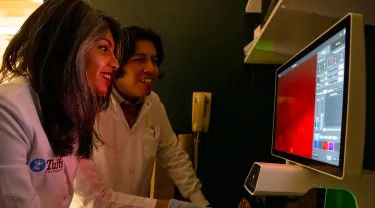When Nisha Iyer’s students do their homework—watching, say, the blockbuster Jurassic Park or the manga-inspired Ghost in the Shell—they need to be thinking about questions like, what are the ethics of genetically engineering animals? What’s the relationship among technology, AI, and neuroscience? How is memory formed?
That’s because the students are taking Sci-Fi and Biotechnology, one of 17 classes called EN1, mostly aimed at first-semester students trying to decide which kind of engineering will be their major. Iyer, an assistant professor in the Department of Biomedical Engineering, considers sci-fi an avenue into discussions about complex ideas, scientific history, and science itself. “Science fiction is reflective of the things that are happening in society as they pertain to science,” she said, “and the fears about it.”
With research interests that lie at the intersection of developmental biology and regenerative medicine, Iyer focuses her own lab studies on how regional specificity impacts development, degeneration, and regeneration in the central nervous system and beyond, developing biomanufacturing strategies and organoid technologies to direct cell therapy research.
She brings those studies into the undergraduate classroom by finding relatable ways to expose students to contemporary biotechnology, biomedical engineering design principles, and other issues, such as bioethics and regulations around research.
An example of a film one of her classes watched is Never Let Me Go, a dystopian narrative from 2012 about young people whose organs are harvested for transplanting. The film, based on the novel by Kazuo Ishiguro, gave rise to important discussions about the goals of scientific engineering of artificial organs, Iyer said, and led to a series of lectures on cloning, stem cells, and artificial organs, along with a group project on how to create artificial organs—and the implications of that technology.
Trying to cover all biotechnology in a one-semester class isn’t easy. But according to Iyer, the movies she assigns offer highly generative ways to start having conversations about the science that is happening now at the same time that the films help these future engineers consider the areas of study they want to pursue.
